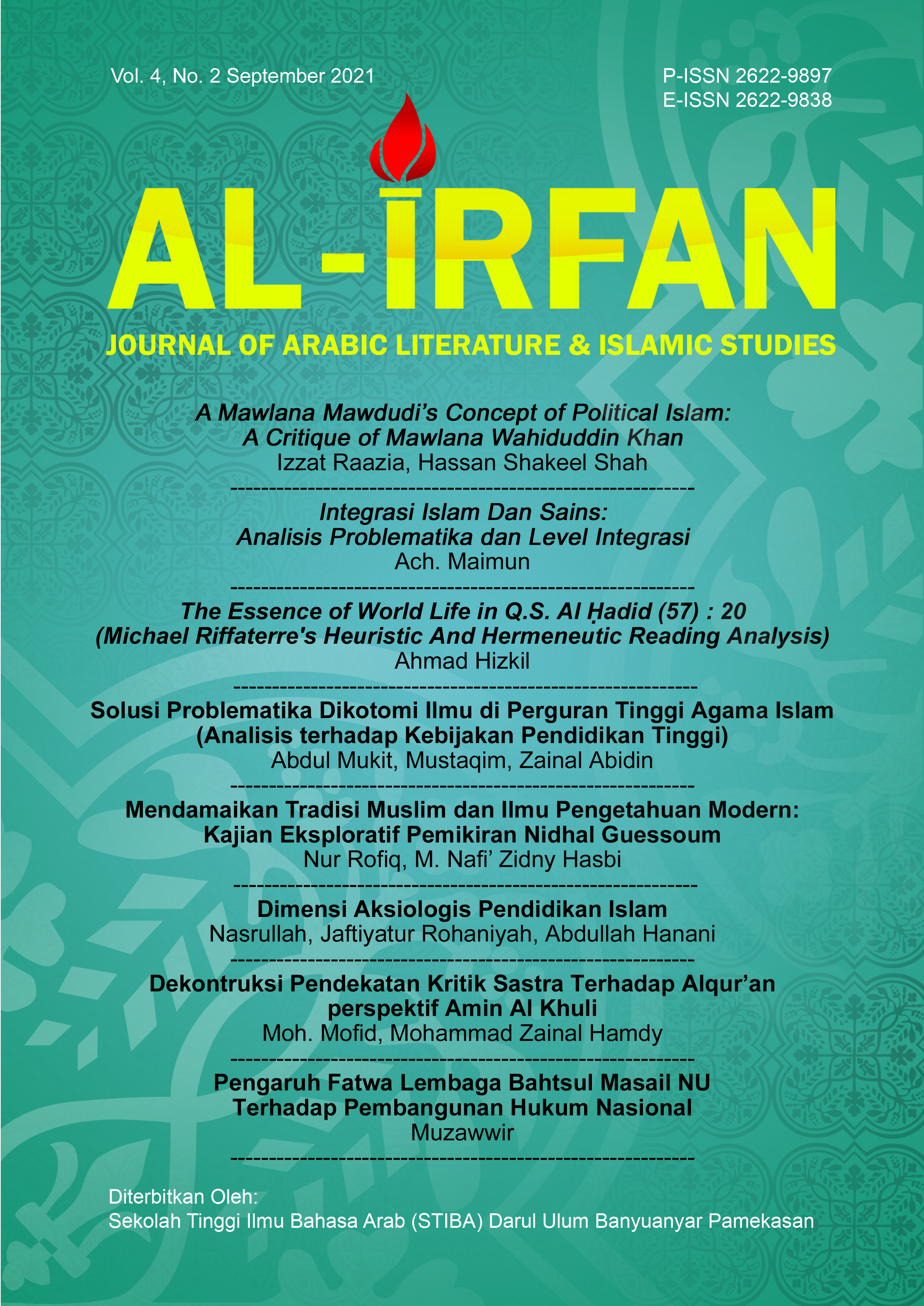Mawlana Mawdudi’s Concept of Political Islam
A Critique of Mawlana Wahiduddin Khan
DOI:
https://doi.org/10.36835/alirfan.v4i2.4982Keywords:
Mawlana Mawdudi, Political Islam, Jamaat-i-Islami, Jihad, Mawlana Wahidudin KhanAbstract
Syed Abul A'la Mawdudi was a Muslim scholar, ideological thinker, philosopher, jurist and journalist. He worked for the revival of Islam and disseminated his understanding of ‘true Islam’. This paper is categorized into two sections. The first section of this paper aims to explore the concept of Mawlana Mawdudi regarding political Islam and his role as a 20th century Islamic revivalist. The second section deals with critique of Mawlana Wahiduddin Khan on Mawlana Mawdudi’s powerful Islamic ideology. Mawlana Mawdudi viewed Islam as the religion that is all-encompassing and Islamic state as universal that should not be limited to a particular geographical region and Muslims should strive for the establishment of Islamic state through Islamic revolution. In Mawlana Khan’s ‘The Political Interpretation of Islam’, he considered Mawlana Mawdudi’s distinctly political interpretation as problematic.References
Adebayo, RI. “The Political Thought of Mawdudi as a Template for Democratic Sustainability in Nigeria.†Al-Jami ah Journal of Islamic Studies 54, no. 1 (2016). https://aljamiah.or.id/index.php/AJIS/article/view/54106.
Ahmad, Irfan. Islamism and Democracy in India: The Transformation of Jamaat-e-Islami. Princeton: Princeton University Press, 2010.
Cheema, SA. “Problematizing the Religious Basis of Mawdudi’s Political Theory.†Studies on Asia Series 3, no. 2 (2013). https://papers.ssrn.com/sol3/papers.cfm?abstract_id=2388771.
Dahlkvist, M. The Politics of Islam, Non Violence, and Peace: The Thought of Maulana Wahiduddin Khan in Context. Sweden: City print Norr AB, 2019.
Iftikar, A. “Jihad and the Establishment of Islamic Global Order: A Comparative Study of the Worldviews and Interpretative Approaches of Abu Al-A‘la Mawdudi and Javed Ahmad Ghamidi.†McGill University, 2004.
Jackson, R. Mawlana Mawdudi and Political Islam: Authority and the Islamic State. New York: Routledge, 2011.
Khan, M. W. “Islamic Critique of the Politics-Centric Misinterpretation of Islam. CPS International.†2016. https://cpsglobal.org/content/islamic-critique-politics-centric %09misinterpretation-islam.
———. “The Political Interpretation of Islam. New Age Islam.â€
Khan, M. W. The Political Interpretation of Islam. India: Greenword Book, 2015.
M. Hassan. Sayyid Abul A`ala Mawdudi and His Thought. 1st ed. Lahore: Islamic Publications, 1984.
M. R. Arjum, Bilal Ahmad Wani. “Concept of Peace in Islam: A Study of Contributions of Mawlana Wahiduddin Khan to Peaceful Coexistence.†International Journal of Scientific and Research Publications 7, no. 6 (2017).
Marath, M. M. “Abul A’la Mawdudi and Sayyed Qutb on Revolution: A Comparative Analysis.†AL-ADWA (n.d.). http://pu.edu.pk/images/journal/szic/PDF/5-Engv32_47_17.pdf.
Nasr, V. R. Seyyed. Mawdudi and the Making of Islamic Revolution. Oxford: University Press, n.d.
Okawa, R. “Interpretation of the Quran in Contemporary India: Wahiduddin Khan’s Reading of Peace and Spirituality in the Scripture.†International Journal of Islamic Thought 16 (2019). http://www.ukm.my/ijit/wp-%09content/uploads/2019/12/IJIT-Vol-16-Dec-2019_10_108-121.pdf.
Pugachev, V. V. “Abul A‘La Mawdudi’s Concept of Hakimiyya and Its Critical Assessment in Islamic Legal-Political Thought.†Law 9, no. 2 (2015). http://hdl.handle.net/11701/10313.
T. Ushama, N. M. Osmani. “Sayyid Mawdudi’s Contribution towards Islamic Revivalism.†IIUC STUDIES 3 (2006).
W. Mehmood, W. Ahmad. “Mawlana Mawdudi, Islam and Ideology.†Al-Azhar 4, no. 1 (2018).
Zaheer, K. The Political Interpretation of Islam, 2019. http://www.khalidzaheer.com/the-political-interpretation-of-islam/.
Downloads
Published
How to Cite
Issue
Section
License
Copyright (c) 2021 Izzat Raazia, Hassan Shakeel Shah

This work is licensed under a Creative Commons Attribution 4.0 International License.
Lisensi :
Al-Irfan: Journal of Arabic Literature and Islamic Studies is published under conditions Creative Commons Attribution 4.0 International License / CC BY 4.0 This license permits anyone to copy and redistribute this material in any form or format, modify, modify, and make derivative works of this material for any purpose, including commercial purposes, so long as they credit the author for the original work.











